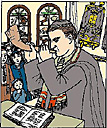 |
|
BLOG
Struggling to Connect to the High Holidays
I find the High Holidays extremely difficult to connect to.
See the vast majority of Jewish holidays incorporate experiential learning into the holiday experience. On Sukkot we literally try to live outside in huts as our ancestors once did and during Passover we recreate the Exodus via symbols, rituals and stories, etc.
However on Rosh Hashanah and Yom Kippur, there is a lack of experience. When I think of these days, I imagine long and endless hours sitting in synagogue counting down the minutes. Between the drawn out prayers and the constant speeches being given by the Rabbi, the most interesting thing going on is probably the shul bulletin - which I usually read about 10 times.
The problem that I (and I imagine many other Jews) have with these days is quite simple. On Rosh Hashanah and Yom Kippur we are supposed to imagine that we are going through a yearly judgement of our actions. This time of year, as the popular High Holiday prayer goes, “on Rosh Hashanah (our fate) is written and on Yom Kippur we are sealed.” This idea, along with the underlying theology, is just unbelievable for the vast majority of Jews in today’s world. The claim that God is, in any way, whether literally or metaphorically, judging us for the past year and then using his decision to decide our success in the future, sounds more like a fairy tale to get children to behave than a seriously metaphysical claim.
Now of course, we can make these holidays into something different. We can discuss how the High Holidays are all about an inner-reflection about the year that has passed, or a way to look forwards to the future. These claims are true, but it is extremely difficult to disconnect them from the pervasive theological elements of the day. Furthermore, I can do a much better job at reflecting in a forest than I can in a synagogue.
Interestingly enough, the history and origins of Rosh Hashanah and Yom Kippur are actually quite different than the other Jewish holidays. Most Jewish holidays (at least the Biblical ones) were created sometime in the First Temple period and have their roots in the agrarian calendar. These major Biblical holidays (otherwise known as the Shalosh Regalim), each initially represented a time in the planning cycle and were later incorporated into also representing some other mnemo-historical event.
Rosh Hashanah and Yom Kippur fit neither of these categories. There is nothing agrarian or mnemo-historical about them; rather this is a day where the main focus is theological. These facts, when added to the historical and literary record, have caused the vast majority of scholars to posit that these holidays were actually created post-First Temple, sometime during the Babylonian exile. It was the Babylonians who viewed God (Marduk) as a kingly figure, seated on a throne, judging his creations and deciding their fate for the upcoming year. And it was the Babylonians who had a big new year celebration centered around this idea.
Now it is important to make something extremely clear. The fact that we can trace a religious ritual back to its historical roots is not, in my opinion, a good reason to devalue it. Technically we can trace back anything we love and cherish in our world to its original roots and that should not cloud our judgment. A ritual, just like an individual, should be judged by the process and evolution that it undergoes throughout its life - rather than its starting identity.
All this aside, I still have not found a meaningful way to approach these holidays. Maybe I am embarking on a fool’s errand in trying the find meaning in the High Holidays that is separate from its underlying theology. However, I am still hopeful, which is why I am now posing the question to you.
What do you think?
---
Have something to add? We'd love to hear from you. Please comment below to share.
 Must Jews attend synagogue on Rosh Hashana and Yom Kippur? See answers from Orthodox, Conservative and Reform rabbis here.
Must Jews attend synagogue on Rosh Hashana and Yom Kippur? See answers from Orthodox, Conservative and Reform rabbis here.If you have a question about Jewish values that you would like to ask rabbis from multiple denominations, click here to enter your question. We will ask rabbis on our panel for answers and post them. You can also search our repository of over 700 questions and answers about Jewish values.
For more great Jewish content, please subscribe in the right hand column. Once you confirm your subscription, you'll get an email whenever new content is published to the Jewish Values Online blog.
For more great Jewish content, please subscribe in the right hand column. Once you confirm your subscription, you'll get an email whenever new content is published to the Jewish Values Online blog.
|
|
|
Jewish Values Online
Home | Search For Answers | About | Origins | Blog Archive Copyright 2020 all rights reserved. Jewish Values Online N O T I C E
THE VIEWS EXPRESSED IN ANSWERS PROVIDED HEREIN ARE THOSE OF THE INDIVIDUAL JVO PANEL MEMBERS, AND DO NOT
NECESSARILY REFLECT OR REPRESENT THE VIEWS OF THE ORTHODOX, CONSERVATIVE OR REFORM MOVEMENTS, RESPECTIVELY. |